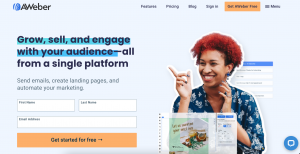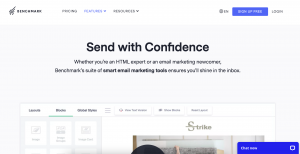Email Marketing Platforms For Small Businesses.

Have you ever read the witty emails from shopping sites or food delivery services that slide into your notifications bar in the middle of the day?
These emails make sure to precisely target our weak points, leaving us yearning for their goodies for the rest of the day. This is where email marketing platforms come into the picture. Using this, companies have mastered the science of sending emails to specific audiences for specific purposes.
The act of delivering a commercial message via email, usually to a set of people, is known as email marketing. And email marketing platforms make the entire task automated. It includes sending adverts, making business requests, or requesting feedback or purchases over email.
Building brand awareness, trust, and loyalty are three major goals frequently pursued by email marketing methods. In short email marketing typically refers to sending emails to improve a business’s relations with existing or former customers, fostering loyal buying behavior, attracting new customers, or persuading existing ones to make a quick purchase.
In this blog, we’ll discuss the foundations of email marketing and what tools can you use to launch a successful email campaign.
Email Marketing Platforms For Small Businesses and Solopreneurs
Email marketing can be an effective way for small businesses to reach out to their customers, build relationships, and increase sales.
Many statistics show how email marketing can be effective for small businesses. Here are a few examples:
Increased ROI:
According to a study by the Direct Marketing Association, email marketing has an average ROI of $42 for every $1 spent. This is a higher ROI than other marketing channels such as social media, direct mail, and paid search.
Higher conversion rates:
A study by Monetate found that email marketing drives more conversions than any other marketing channel, including search and social media. Email has an average conversion rate of 4.24%, compared to just 2.49% for search and 0.59% for social media.
Increased customer retention:
According to a study by eMarketer, email is the most effective channel for customer retention. 80% of retail professionals say that email marketing is their greatest driver of customer retention.
Cost-effective:
Email marketing is a cost-effective marketing channel for small businesses. According to a study by HubSpot, email marketing has a Cost Per Lead (CPL) that is 3 times lower than social media.
Personalization leads to higher engagement:
Personalized emails have been shown to have higher open rates and click-through rates than generic emails. A study by Experian found that personalized emails have a 29% higher open rate and a 41% higher click-through rate than non-personalized emails.
Overall, these statistics show that email marketing can be an effective marketing channel for small businesses to increase their ROI, drive conversions, retain customers, and cost-effectively engage with their audience.
Here are some ways small businesses can use email marketing to grow their business:
Build a targeted email list:
Small businesses should focus on building a targeted email list of people who have permitted to receive marketing emails. This can be done by offering an incentive, such as a discount or a free resource, in exchange for signing up for the email list.
Create compelling email content:
The email content should be engaging, and informative, and provide value to the recipients. It should be personalized, relevant to the recipient, and include a clear call-to-action (CTA) that encourages them to take action.
Segment your email list:
Small businesses should segment their email list based on customer behavior, demographics, and interests. This allows for more targeted and personalized messaging, which can lead to higher engagement and conversions.
Automate your email campaigns: Small businesses can use email automation to streamline their email campaigns and ensure that the right message is delivered to the right person at the right time. This can include welcome emails, abandoned cart emails, and follow-up emails after a purchase. We’ll suggest a few software in this blog.
Analyze and optimize:
Small businesses should track the performance of their email campaigns and use the data to make informed decisions about what is working and what needs to be improved. This can include analyzing open rates, click-through rates, and conversions.
Automation in email marketing is accessible to everyone, even individuals and small businesses. But it’s important to identify the right email software. Here are some tips from our side.
Capabilities of Email Marketing Platforms Have
Mobile responsive format
Your emails should be just as simple to read on the smaller device as more and more people read emails on smartphones as it is convenient. Inappropriate mobile optimization will hurt your sales and unfairly reduce your reach. 47% of users use their mobile applications to open emails.
Moreover, many email marketing platforms optimize messages for smaller displays and offer a range of mobile-friendly designs. Users of smartphones and tablets can swiftly scan emails thanks to these features.
Automation of activities on email marketing platforms
You’re passing up a chance to create more effective procedures if you’re still manually scheduling email marketing campaigns. You can automate a series of email events from welcome emails to order email confirmations with the right email marketing software. There are also prescribed templates that you can use.
With a push interface, top platforms make it even simpler to create emails instantly and schedule them to be sent in reaction to specific events. Each email automatically sent out gives you more time to focus on other aspects of your business.
Testing of Spam Emails
Spam filters can provide a significant challenge to email marketing performance. Your communications won’t even reach the inbox if they are repeatedly marked as spam; instead, they will be placed in the spam folder, where they will be more unlikely ever to be seen or opened.
According to a survey by OpinionMonster, 47% of email receivers decide whether or not an email is spam solely on the subject line. At the same time, 69% of email recipients report email as spam based solely on the subject line.
You can find any content that might set off spam filters and reduce the deliverability of your emails by conducting spam testing. Some service providers can check your emails with spam filters from various popular clients to ensure you aren’t neglecting any issues just for a specific email platform.
Safety Barriers to Brand and Compliance
You can utilize templates or modules in an HTML code editor or ESP builder, but the finest email generation tools offer a significant layer: Granular brand guardrails. Administrators can specify brand guidelines to uphold brand standards and legal and compliance requirements thanks to these guardrails.
Popular Email Marketing Platforms
We’re sharing a list of easy-to-use email marketing platforms. You can subscribe on a pay-per-user/per-month basis.
There are many email automation tools available for small businesses, each with its features and benefits. Here are some of the best email automation tools for small businesses:

Mailchimp is a popular email marketing and automation tool that offers a user-friendly interface and a variety of automation features, including welcome emails, abandoned cart emails, and product follow-up emails. It also offers a free plan for businesses with up to 2,000 subscribers. When you subscribe to the first paid plan, you can access more sophisticated features like A/B analysis and multi-step journeys.
Users will appreciate the straightforward reporting that enables them to identify what works and isn’t working. Business owners may view the material by viewing email marketing and click-throughs.

Zoho Campaigns is one of the best cloud-based email marketing platforms designed to help businesses of all sizes create, send, and track email campaigns. It provides a wide range of email templates, customizable signup forms, and pre-built automation workflows to help businesses engage their audience and grow their customer base.
Zoho Campaigns also includes features such as A/B testing, email segmentation, social media integration, and real-time analytics to help businesses improve their email marketing performance and measure their success.
Signup now to experience Zoho campaigns.

ConvertKit is an email automation tool that is designed specifically for bloggers, creators, and small business owners. It offers a variety of automation features, including email sequences, automated tagging, and customizable opt-in forms.

Aweber is an email marketing and automation tool that is designed for small businesses and entrepreneurs. It offers a variety of automation features, including email sequences, subscriber segmentation, and email analytics.

With Sendinblue, you can create professional-looking emails in no time. Choose from the template library or design your template, personalize and send it to your target audience at the right time as it uses machine learning to suggest the best time to send emails.
These email automation tools offer a variety of features and benefits that can help small businesses streamline their email marketing and increase their engagement and conversions. The best tool for a particular small business will depend on its specific needs and budget.
Benchmark Email is an email marketing software that helps businesses of all sizes create and send professional-looking email campaigns to their subscribers. With Benchmark Email, users can easily design custom email templates, automate email sequences, and track the performance of their campaigns with real-time analytics. The software also includes features like list management, A/B testing, and integrations with popular marketing tools like Salesforce, Shopify, and WordPress.
Overall, Benchmark Email is a user-friendly and comprehensive email marketing solution that can help businesses increase their email engagement and drive more conversions.
Conclusion
Planning an email campaign on email marketing platforms is an important process that can help small businesses ensure that their emails are engaging, and effective, and drive results. Here are some steps to follow when planning an email campaign:
Define your goals:
Start by defining the goals for your email campaign. What do you want to achieve with your emails? Do you want to drive more sales, increase website traffic, or promote a new product or service? Defining your goals will help you determine the type of content, messaging, and CTAs you should include in your emails.
Define your audience:
Next, define the audience for your email campaign. Who are you targeting with your emails? What are their demographics, interests, and behaviors? Understanding your audience will help you create more targeted and personalized content that resonates with them.
Choose your email type:
There are many types of emails you can send, including promotional emails, newsletters, welcome emails, and cart abandonment emails. Choose the type of email that aligns with your goals and audience.
Create compelling content:
Your email content should be engaging, and informative, and provide value to the recipient. It should be personalized, relevant to the recipient, and include a clear CTA that encourages them to take action.
Design your email:
The design of your email should be visually appealing, easy to read, and consistent with your brand. Use images, colors, and typography that align with your brand and messaging.
Test and optimize:
Before sending your emails, test them to ensure that they are rendering correctly and are mobile-responsive. After sending your emails, track their performance and analyze the results. Use this data to make informed decisions about what is working and what needs to be improved in future campaigns.
By following these steps, small businesses can plan and execute effective email campaigns that engage their audience, drive results, and grow their business.





